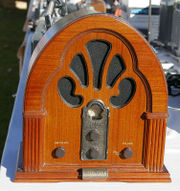
How much does a portable radio cost in Cuba?
It is known that during the first days of November the Eastern Cuban provinces suffered from the passing of hurricane Sandy, and that despite its pretty name, it was a destructive meteorological phenomenon that resulted in more than 10 deaths and multimillion material damages.
It will remain in the memory of the eastern province residents as a cyclone that could have crossed those provinces “as a mere meteorological tantrum”, but due to the general poverty of the area, the humiliating and infinitely bad roof tiles — made of cardboard, asphalt, and sand — used as permanent cover, many zinc rooftops and roofs held down “by the goodwill of God”, rusted by the passage of time, in addition to intense rain and floods, created a unique condition that destroyed, due to this Belcebú hurricane, the puny material possessions of many in the region.
We don’t know if most of the damage happened because when they cut electricity due to the high winds nobody coud use a radio receptor to find out the path of the tropical phenomenon, and if those who did have radio receptors, had batteries to make them functional; or perhaps the civil defense did not function with the usual swiftness and order. It caught my attention that the interviews of the local and provincial authorities, conducted during those days, reported that many families evacuated on their own (auto-evacuated?) to houses of families and friends. I don’t know if that was true, if it was guided from the capital, or if it was an easy way out that the local authorities adopted to save fuel. If that was it, where did the saved fuel go?
A few years ago, my mother and I discovered in a neighborhood store a portable radio, no taller than 10 centimeters, selling for 90 CUCs – hard Cuban currency, not the same as the currency used to pay Cuban workers. Some time afterwards, the dollar market was invaded with Chinese radio receptors at $10 which required batteries, solar and rechargeable — the most commonly used one — but they only lasted as long as it took to charge them.
We hope the state believes the people regarding this situation in order to be prepared, individually and collectively, for another phenomenon of this kind, thereby minimizing impact and damages, so that among the hurt and the sarcasm there will be no need to paraphrase the song of the Dominican singer Juan Luis Guerra:hope that radios rain down on the Cuban fields.
Translated by: Marina Villa
November 27 2012
